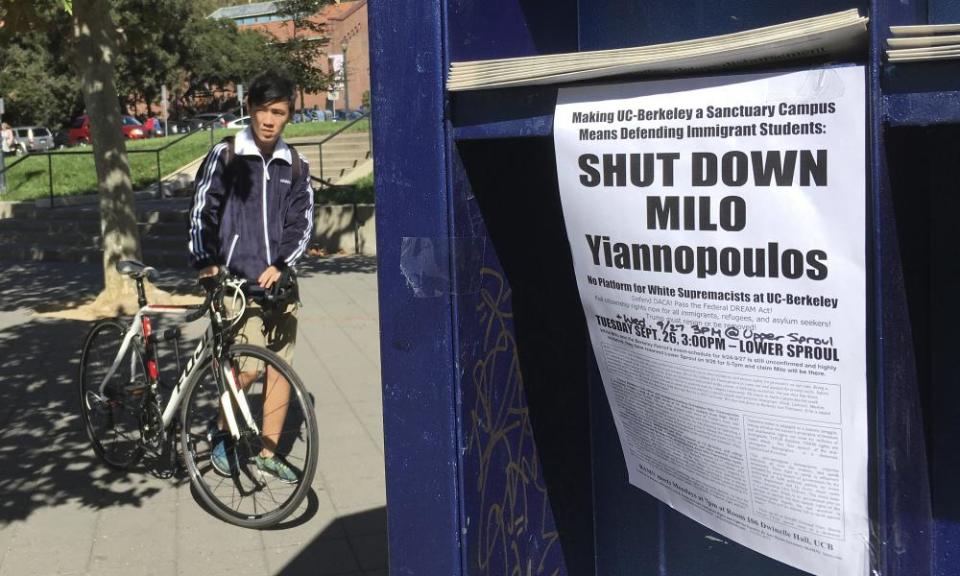Far-right 'Free Speech Week' at Berkeley collapses in recrimination and discord
Organizers call off far-right festival less than 24 hours before it was due to start
University says Berkeley Patriot group had not given reason for cancellation

Organizers of a week-long far-right festival planned for the University of California, Berkeley called off the event on Saturday, less than 24 hours before it was due to start and amid suggestions the event may have been little more than a student stunt.
The cancellation of Free Speech Week, which had been due to feature rightwing provocateur Milo Yiannopoulos and other speakers, was announced by campus spokesman Dan Mogulof.
Mogulof said in a statement that staff had been preparing for the event for eight weeks. It was, he said, “extremely unfortunate” that the cancellation “was made at the last minute, even as the university was in the process of spending significant sums of money and preparing for substantial disruption of campus life in order to provide the needed security for these events”.
Since Donald Trump’s victory in the 2016 presidential election, Berkeley has become a centre of far-right demonstrations and counter-protests. Some face-offs have become violent. Mogulof said the Berkeley Patriot, the group behind Free Speech Week, had not offered a reason for the cancellation.
Other promised speakers included author David Horowitz, activist Lisa De Pasquale and Breitbart contributor Ariana Rowlands. Several announced speakers, among them Ann Coulter and former White House strategist Steve Bannon, have said they never planned to appear or had no knowledge of an invitation.
“I never planned to speak,” Coulter said in an email to the Los Angeles Times on Friday. “My speakers bureau never booked me to speak at Berkeley. No contract for me to speak existed.”
Yiannopoulos was due to hold a news conference on Saturday afternoon. After it was cancelled he said in a video broadcast on Facebook he would stage a rally with fellow rightwingers on Sunday on Sproul Plaza, the center of activity on campus during the 1960s, “come hell or high water”.
A counter-demonstration, billed as “No Hate in the Bay: March Against White Supremacy”, went ahead on Saturday.
Lucian Wintrich, of the rightwing site Gateway Pundit and a scheduled speaker, told the Guardian organizers knew as long as a week ago the event could not proceed.
“The entire thing is a complete disaster and unfortunately makes us all look very unprofessional,” he said.
“It was completely mismanaged and they should have told people earlier this week it wasn’t happening rather than waiting until the last minute. Obviously, if the organisers of an event don’t actually organise an event, then the event won’t happen.”
Wintrich said he believed Bannon had been happy for the event to take place and for his name to be used.
Amid widespread unease over the targeting by far-right groups of a university long associated with liberal protest, Mogoluf said claims the cancellation of the festival was desired by campus authorities were “without basis in fact”. The university, he said, “was prepared to do whatever was necessary to support the first amendment rights of the student organization”.
Earlier reports claimed that the university has incurred at least $1.4m in security costs since February, when a Yiannopoulos appearance sparked violent protests. “Free speech is not free, it turns out,” college president Janet Napolitano told the LA Times.
Mogulof told the Guardian he estimated UC Berkeley had spent more than $100,000 on security for Free Speech Week that could not now be recouped. He said the planned festival, like the events in February, had “rocked the campus”.
“We’re a small city of 50,000 people, and many believed that the first amendment does not protect hate speech when it most certainly does,” he said.
Mogulof added that many faculty members and students had been “concerned about disruption to the campus and academic operations or that members of the paramilitary antifa movement would return”. He said others worried about “assaultive rhetoric used by some of the speakers”.
The university would discuss how to deal with future efforts by rightwing groups to visit Berkeley, Mogulof added.
“We are a great stage for those who want attention,” he said. “We are seen as a bastion of liberal thought, and as a public research university this comes with the territory. So we are going to have our work cut out.”

